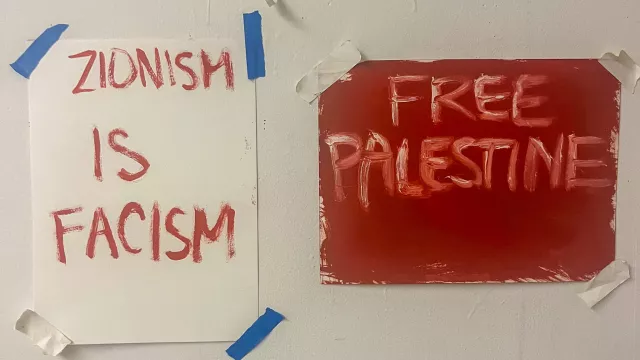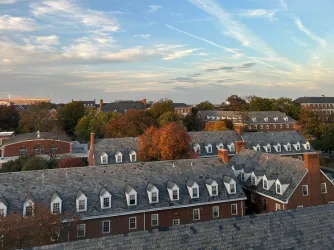Table of Contents
Queens College calls cops over Muslim student group’s Instagram posts

Imagine you’re in a college student group with strong political perspectives. Your group’s social media account publishes satirical posts expressing skepticism of a major news story. This offends and frightens some people, who then report you to your school. As a result, your group is investigated — not just by your school’s office of compliance and diversity, but also by the local police.
If you’re thinking this is Orwellian fan fiction, you should be right. Unfortunately, it’s a very real story.
Late last fall, the Queens College Muslim Student Association published two stories on its (now deleted) Instagram account questioning reports related to Hamas’ Oct. 7 attack on Israel. The first featured an image of three gummy bears with their heads bitten off and a message reading, “BREAKING NEWS: Israeli intelligence releases gruesome images of Israeli babies whose heads had been decapitated and consumed by Hamas militants.” The second contained text reading:
oven baked baby = hoax
mass rave rape = hoax
40 decapitated babies = hoax
baby decapitated in the womb = hoax
This is tiresome at this point.
On Nov. 3, more than 30 Orthodox Jewish psychologists and doctoral students — many of them Queens College alumni — sent a signed letter to Queens College President Frank Wu demanding the Muslim student group delete the posts. They also argued the posts should prompt “immediate disciplinary action for all students involved,” because, they claimed, the sentiment expressed “physically endangers” Queens College “students and [their] community by inciting hatred and violence against Jews.”

The next day, Wu released a statement calling the Muslim student group’s posts “contrary to [Queens College’s] community values” and saying the college “will not hesitate to denounce what is so deeply hurtful, offensive, and damaging.” The statement continued:
The Office of Compliance & Diversity is conducting a thorough review and investigation of these matters. Following findings, those who are found to be in violation of policy may be subject to sanction and/or disciplinary action.
Notably, the statement indicated the school had contacted and would “continue to cooperate with the NYPD” in investigating the Queens College Muslim Student Association’s posts.
This is a blatantly unconstitutional violation of the student group’s First Amendment rights, and a disturbing omen of just how bad things can get for free speech on campus.
Investigations like these are unconstitutional, given Queens College’s status as a public university legally bound by the First Amendment
In his statement, Wu urged the Queens College community “to respectfully engage in civil dialogue and factual discourse, consistent with college and university policies as well as governmental laws,” and described the school as “as an institution of higher education committed to the pursuit of inquiry.”
Despite this, Queens College called the cops because a student group’s protected speech disturbed people.
This is cause for concern when the speech in question is clearly protected. As a FIRE letter to Wu on March 6 states:
As a public institution, QC’s regulation of student expression must comport with the First Amendment’s “bedrock principle” of viewpoint neutrality, even toward ideas and views some or even most may find offensive or hateful. It is well-settled that QC “may not restrict speech or association simply because it finds the views expressed by any group to be abhorrent.”
“As commentary on the ongoing Middle East conflict,” FIRE’s letter continues, the Queens College Muslim Student Association’s Instagram posts “fall well within any reasonable understanding of political advocacy the First Amendment protects, with use of satire and humor that is commonplace.”
Importantly, FIRE’s letter also notes, the posts are protected regardless of their veracity: “Even if factually wrong, [the] Instagram posts do not involve the type of material gain or legally cognizable harm that justifies government regulation of false speech.”
Lastly, despite claims by the psychologists and doctoral students in their letter, the posts from the Muslim student group do not meet the standard for incitement or any of the other categories of unprotected speech, including harassment. Incitement applies only to speech that is intended and likely to produce imminent lawless action. As for harassment, the U.S. Department of Education has made clear that, to be actionable, it “must include something beyond the mere expression of views, words, symbols or thoughts that some person finds offensive.”
Investigations like these are unconstitutional, given Queens College’s status as a public university legally bound by the First Amendment, and they chill free expression on campus. Beyond the Muslim student group itself feeling silenced and stifled, individual students are now reluctant to wave the Palestinian flag or wear keffiyehs (Palestinian scarves) on campus — all examples of protected expression — for fear of reprisal and further investigation from Queens College in collaboration with the NYPD.

Brooklyn College silences pro-Palestinian student expression in misguided quest for campus peace
Brooklyn College student expressed support for Palestinians by posting two signs on the door to her assigned studio space in the fine arts program.
Queens College is free to express its discontent with the student group’s messaging, but in so doing sets a precarious precedent that it will comment on all political and social messaging disseminated by its students, staff, and faculty — or else risk accusations of favoritism and partisanship. As we have seen recently with other schools like Harvard University and the University of Pennsylvania, this is an untenable situation for an institution of higher learning. That’s why FIRE strongly advocates that universities commit to the principles outlined in the University of Chicago’s “Kalven Report,” which emphasizes that a school should be “the home and sponsor of critics” and “not itself the critic.”
If you don’t see the problem with the Muslim student group’s situation because you find the group’s speech hurtful, hateful, or wrong, it is perhaps worth pausing to consider that the very principles that protect their expression will also someday protect your own — even if others find it offensive.
Think about it: In our increasingly contentious cultural climate, if all it takes for your speech to suffer institutional censorship and police investigation is for opponents to claim offense, fear, or psychological distress, it’s not a matter of if official power will fall on your speech, but when.
Recent Articles
Get the latest free speech news and analysis from FIRE.

Free speech in Trump 2.0
Podcast

The Federal Bureau of Investigation (of protected speech)

The paper was her lifeboat — UMD called it interference


